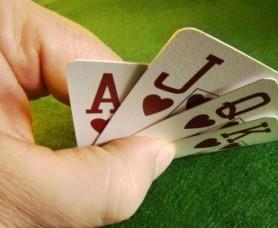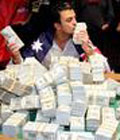研究称越是赌博成瘾越是迷信
寻求治疗的赌徒们相对于不赌博的人来说,越是赌博成瘾,越是迷信。
赌博成瘾的人被认为是缺乏对于冲动的控制力的。不赌博的人害怕涉足的地方,那些赌徒可能反而趋之若鹜。比如:打赌Mets队靠两个青年联赛升上来的新人战胜Halliday和Lee,从而赢得Philles队取得两连胜?真是个好主意!
一个对英国赌徒的研究发现,最上瘾的人,也是最不理性的人。比如,他们会在迷信上做过多的投入,像注重仪式或者是带着幸运币。或者他们坚信,他们选的老虎机只不过是有点着凉了,因此才不给他们机会赢。所以他们不会考虑真正的概率问题,才是决定他们所谓的运气的东西。
这项研究观察了30个上瘾的赌徒,他们在英国国家问题赌博诊所接受治疗。发表在了心理医学杂志上。
30个不赌博的人作参照组。注意到一个有趣的现象:在这项研究中的赌徒们,意识到了自身有问题急需治疗。其他赌徒可能更加不理性。
Compulsive gamblers seeking treatment were more impulsive and more likely to be superstitious than were non-gamblers. Steve Mirsky reportsCompulsive gambling is marked by poor impulse control. Where a non-gambler fears to tread the compulsive gambler may rush in. Bet on the Mets to sweep a doubleheader against the Phillies with two kids brought up from AA pitching against Halliday and Lee? Seems like a great idea!
Now a study of British gamblers finds that the ones who were the most impulsive were also way more likely to reason incorrectly. For example they put more stock in superstition like rituals or carrying a lucky coin. Or they’ll believe more fervently that they got a slot machine that had simply gone cold offering them no chance to win. Thereby discounting the actual laws of probability that govern their alleged luck.
The study looked at 30 compulsive gamblers who sought treatment at England’s National Problem Gambling Clinic. It was published in the journal Psychological Medicine.
Thirty non-gamblers served as the control group. An interesting point to consider is that the gamblers in the study were aware enough to know that they had a problem in need of treatment. Other compulsive bettors may be even less rational.
- 上一篇:烟酒业与博彩业受投资者青睐
- 下一篇:体育博彩交易(一)
相关推荐
随机专题



 您现在的位置:
您现在的位置: 
 玩刺激的真钱炸金花就要懂得赢钱方法!
玩刺激的真钱炸金花就要懂得赢钱方法! 难比登天的麻将胡牌牌型
难比登天的麻将胡牌牌型 玩麻将游戏可以赚钱
玩麻将游戏可以赚钱 澳门博彩网站提醒:去澳门赌场必知的十大戒律!
澳门博彩网站提醒:去澳门赌场必知的十大戒律!


